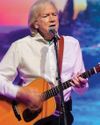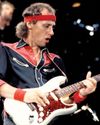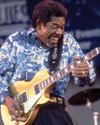Successfully fusing elements of blues, gospel, old-timey music and English folk might seem like an impossible task for anyone to undertake. But it’s all in a day’s work for Mr Simpson, reckons David Mead.

We begin by asking how his all-encompassing attitude to many different forms of music began in the first place…
“I was very fortunate in that there was a parallel and integral nature to the folk scene when I started. I would go to my local folk club and see Martin Carthy one week and then I would see Mike Cooper with his National guitars the next week. I might see Stefan Grossman in a month and then I might see Finbar Furey playing the pipes, which was, as far as I’m concerned, like seeing Jimi Hendrix. There was all this extraordinary availability of fantastic guitar players playing everything from morris tunes to the darkest experimental blues, so it was a great time to be me.
“But it’s fair to say that getting the banjo opened a door to me for this whole thing of altered tunings. Obviously, you get the guitar and you put it in D and you put it in G and that opens a massive door to old-time fingerpicking and blues and what have you. But then the moment that you introduce the banjo, you’re immediately into the realm of modal tunings: Gsus4, Cadd9 and DADGAD – all those which now are universally accepted as guitar tunings, they’re all banjo tunings.
This story is from the {{IssueName}} edition of {{MagazineName}}.
Start your 7-day Magzter GOLD free trial to access thousands of curated premium stories, and 9,000+ magazines and newspapers.
Already a subscriber ? Sign In
This story is from the {{IssueName}} edition of {{MagazineName}}.
Start your 7-day Magzter GOLD free trial to access thousands of curated premium stories, and 9,000+ magazines and newspapers.
Already a subscriber? Sign In

THE MOODY BLUES
This month Stuart Ryan delves into the picking style of this British prog legend whose acoustic guitar has powered many a Moody Blues song.

WAYNE KRANTZ
This issue Nick Mellor provides an insight into this brilliant jazz stylist, focusing on his approach to improvising over static chords.

OPEN G TUNING
Open tunings are great fun and can help create exciting new ideas. Simon Barnard shows how to incorporate open G tuning into your playing.

RODRIGO GOUVEIA
Last month we featured Mateus Asato, and mentioned the importance of the neo-soul style in his playing. Here we turn to his fellow Brazilian, the master of neo-soul fusion.

MARK KNOPFLER
Our topic this month is a master craftsman as both guitar player and songwriter. His style is unique and his influence spreads far and wide.

U2
Martin Cooper checks out the chiming pedal delay tones of this stadium-filling band from Dublin, Ireland, and guitarist The Edge.

LUTHER ALLISON
It’s blues with a touch of soul this month, as David Gerrish explores the dynamic, expressive style of an often overlooked Chicago bluesman.

JOHANN KASPAR MERTZ Capriccio
This month Declan Zapala explores the music of Austria at the turn of the Romantic period with a fiery caprice to level up your fingers and unlock your inner virtuoso.

THE CROSSROADS Michael Landau
John Wheatcroft explores the playing of a session ace _ and blazing blues-rock maestro who graces the top-flight m band of singer-songwriting legend, James Taylor.

VIDEO MASTERCLASS Troy Redfern
This month GT welcomes this slide guitar virtuoso. If you've been wanting to take your slide playing to the next level then this is one's for you. With Jon Bishop.